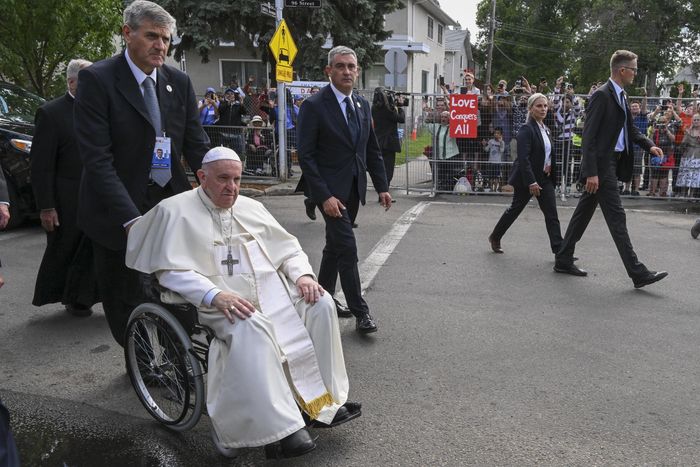EDMONTON, Alberta—Pope Francis’s visit to Canada, which he has described as a penitential pilgrimage, took a more celebratory turn on Tuesday when he presided at Mass in an Edmonton stadium and took part in a traditional lakeside ceremony with indigenous Catholics.
Although organizers of the papal visit and the pope himself have made it clear that its purpose is to apologize for Catholics’ role in what Francis called government-sponsored “projects of cultural destruction and forced assimilation,” his second full day in the country highlighted a more harmonious legacy of the church’s relationship with indigenous Canadians.
On Monday, the pope apologized repeatedly for Catholic participation in the country’s system of residential schools which, for more than a century, assimilated indigenous children to white culture. On Tuesday, he pointed to the church’s practice of presenting its teachings in forms compatible with local cultures.
In its characteristically indigenous elements, including drumming and singing, the afternoon ceremony at Lac Ste. Anne, 45 miles west of Edmonton, marked a contrast to the morning Mass at the stadium, which was celebrated in English and Latin and featured traditional Catholic hymns.
The lake—which was considered sacred before the colonial period by the indigenous peoples who lived on its shores—has been the site of a Catholic pilgrimage in honor of the grandmother of Jesus since the late 19th century. Devotees attribute healing powers to the waters of the lake, which the pope sprinkled on members of the crowd during the ceremony.
In his remarks at the lake, the pope referred to the “painful legacy” of the residential schools and the “terrible effects of colonization.” He also celebrated cultural diversity in the church, which he said was rooted in the Gospel, and praised the work of historical “missionaries who, as authentic evangelizers, preserved indigenous languages and cultures in many parts of the world.”
Even before his visit to Canada, Pope Francis has tried to distinguish the work of Christian missionaries from the colonialism with which it was intertwined. He has sometimes stoked controversy by doing so. On a 2015 visit to Bolivia, he asked forgiveness “not only for the offenses of the church herself, but also for crimes committed against the native peoples during the so-called conquest of America.” Later that same year, in the U.S., the pope canonized St. Junípero Serra, an 18th-century missionary in California who critics say oppressed indigenous people there.
Indigenous leaders and elders in Canada have called on the pope to rescind the church’s so-called Doctrine of Discovery, based on 15th-century papal documents that were used to justify European colonialism. The Vatican spokesman said last week that an official response on the question is forthcoming but might not be ready during the pope’s visit to Canada.
The Rev. Cristino Bouvette, who has led the planning of the worship events for the papal visit, said that indigenous people in what is now Canada embraced Christianity long before the churches took part in the 19th-century government-sponsored assimilationist project of the schools.
“There was a period of time in this country when indigenous people were free to choose whether they wanted faith or not. And if they had it, they chose it,” said Father Bouvette, who is partially of indigenous descent and whose grandmother spent 12 years in a residential school.

Pope Francis met with indigenous people and parishioners of the Church of the Sacred Heart in Edmonton, Canada, on Monday.
Photo: ciro fusco/Shutterstock
Although many indigenous people have remained members of Catholic or Protestant churches, others have been alienated by the experience of residential schools from the Christian denominations that managed them.
Diena Jules, an elder of the Tk’emlúps te Secwépemc community in British Columbia, prayed as a child before a statue of Our Lady of Fatima on the grounds of the Kamloops Indian Residential School, where she says indigenous spiritual traditions were derided as pagan and sinful.
It was Ms. Jules who initiated efforts to search the grounds of the former school, which in May 2021 yielded possible evidence of suspected graves there and set off a reckoning that drew international attention to the history of Canada’s residential schools. The Vatican announced Pope Francis’s intention to visit Canada a few months later.
Ms. Jules says she no longer considers herself a Catholic and has embraced indigenous spirituality instead, but she still respects the Catholic faith of her mother.
According to Christopher Mahon, political adviser to the elected chief of Six Nations of the Grand River, a reservation of the First Nations people, the Catholic Church’s participation in the residential schools “was not in accordance with the church’s best traditions…this was actually a turning of its back on its best traditions.” For instance, the early missionaries to Canada incorporated indigenous languages into the Latin liturgy long before worship in modern European languages became the Catholic norm, he said.
Archbishop Richard Smith of Edmonton said he hoped the papal visit would make that culturally inclusive dimension of the church’s history better known. But he stressed that this would be a byproduct and not the point of the trip.
“It’s not our first priority to take this as an opportunity to tell the good, as if we’re trying to deflect away from the negative that we need to face,” Archbishop Smith said.
Write to Francis X. Rocca at francis.rocca@wsj.com
Copyright ©2022 Dow Jones & Company, Inc. All Rights Reserved. 87990cbe856818d5eddac44c7b1cdeb8


